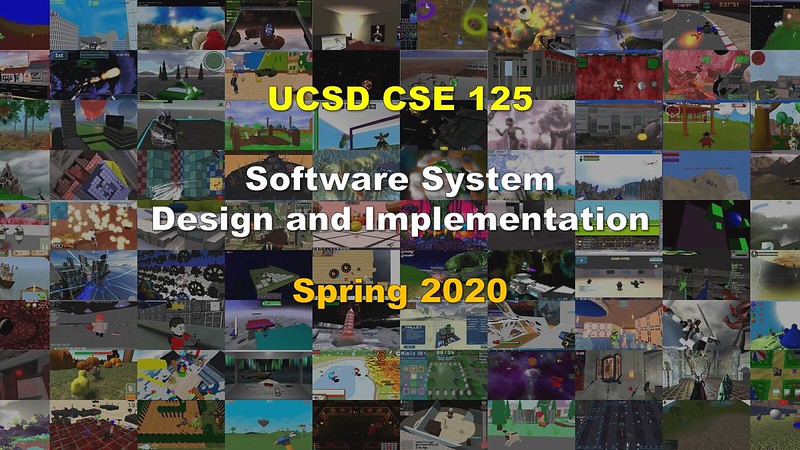A Unique Spring Quarter

Spring quarter 2020 was a unique experience for CSE/CNS Professor Geoffrey M. Voelker, who has been teaching CSE 125/Software System Design and Implementation at UC San Diego for the past twenty years. As with many faculty this year, Voelker had to quickly prepare for a remote class that was never intended to be online. Normally thirty students work closely together in the CSE computer lab in teams of six or seven students and build a distributed, real-time, 3D multiplayer game. This year, because of the global pandemic, the entire course had to be reconfigured for team members to work together (remotely) and the final demo presentation, typically held in front of 200 people in the Qualcomm Institute auditorium Atkinson Hall, was held on Twitch.
CSE 125 requires close collaboration and interaction among the students in each group and having to work remotely added significant hurdles to an already challenging class. Communicating, brainstorming, pair programming and debugging, access to appropriate hardware, and fostering group dynamics were all substantially more difficult than when working in person. The students worked intensely together for ten weeks, yet could not even go to dinner together.
Despite having to work remotely, though, the students succeeded beyond Voelker’s expectations. They quickly took advantage of a wide variety of remote collaboration tools, including Visual Studio Live Share, Zoom, Slack, Discord, Trello, GitHub, and Google Drive. The projects they produced were as creative, inspiring, and impressive as in previous years. Take a look at the videos!
CSE 125 culminates in a final live demo presentation where the students show off everything that they have accomplished in a fun, festive atmosphere. During the quarter, there was a lot of uncertainty in moving the final demos to an entirely remote event. But working closely with the amazing Events team at the Qualcomm Institute (Calit2), they were able to produce high-quality live streaming demos on Twitch that resulted in another memorable final demo experience. Twitch chat was true to its reputation, with many CSE 125 alumni supporting the students during the online demos.
The tradition of guest lectures continued remotely too. Tansen Zhu from Jam City and Ed Wu from Niantic had given lectures in the course before and generously were able to give guest lectures again, entirely online. While the experience is not the same, and the students did not have the opportunity to interact with Tansen and Ed in person, the lectures went very smoothly, and the interactive chat was quite lively.
The students were thankful that CSE 125 was not canceled this year and praised Voelker for adapting the class to be remote on short notice. They also praised Edward Chen, the class TA, for his technical troubleshooting during the ten weeks. The weekly team morale reports submitted to Voelker and Chen were unique. They included a variety of phrases like “life is pretty okay’, “loving this indoor life,” “hate the virus,” “need more air,” “groups are doing work,” and “we are going places.” All the students agreed that working on the project kept them busy and engaged during the quarantine, and by the end of the quarter, they were especially proud of what they accomplished during this challenging time.
CSE 125 – 2020 Class Photo 

Game title: Gaia (Sphere Enix)
Teammates: Yiran Chen, Muyuan Chi, Wenlin Mao, Zi Wang, Peizhen Wu, Chao Zhou.
Gaia is played by two players on each side. One player on the team controls the terrain, and the other player controls the ball. The terrain editor can modify the terrain to help their teammate get points or block the opponent from getting points. The team within the time limit with the highest points wins.
Game Title: Komrade’s Kitchen
Teammates: Brian Chi, Ana Selvaraj, Joshua Quan, Jennifer Wu, William Xu, Shirley Zhang.
The team initially thought about making a heavy co-op game similar to “Keep Talking, and No One Explodes.” Their game ended up being a lighter game with more straightforward mechanics, fun gimmicks, and no co-op elements. Due to time limitations, the co-op aspects were eliminated because the team decided these aspects did not enhance the game’s overall enjoyment. Play-testing and experimentation in the final few weeks allowed the team to develop gameplay mechanics to replace their previous ideas. Their game relies on the gameplay mechanics over level design.
Game Title: Cyber City
Teammates: Jiajian Fu, Aditi Gaur, Kevin Huang, Charles Li, Hao Luo, Esther Zhao.
Cyber City is a multiplayer third-person tower defense game with resources and crafting elements. Players are divided into teams to destroy the enemy base while defending their own. Players can craft turrets and game units that help them intrude into the enemy base. The team that destroys the enemy’s base first will win. The game combines aspects of sandbox survival, tower defense, and multiplayer online battle arena gameplay styles into one competitive game.
Game Title: The Last Roll
Teammates: Cameron Foster, Steven Hausman, Anthony Lau, Patrick Liu, Thiago Marback, Christopher Maytom.
The Last Roll is a cooperative defense game in which players work together to protect a location with resources from a rush of enemy AI players. Players can perform actions such as building barriers and slowing enemies to preserve this location for as long as possible. The game’s theme revolves around the players being workers in a shop during COVID-19, where people are trying to steal the store’s supply of toilet paper. In the game, players must work together since their first-person view restricts their ability to assess the entire shop’s state.
Game Title: Grow Away
Teammates: Joyaan Bhesania, Yang Liu, Etsu Nakahara, Mingqi Shen, Arun Sugumar, Alexander Zhu.
Grow Away is a collaborative action tower defense game, and players defend against waves of zombies. Players need to grow plants that serve as “towers” to attack the enemies and defend the base. The players move across the map to pick up tools and perform actions to grow plants collaboratively.
